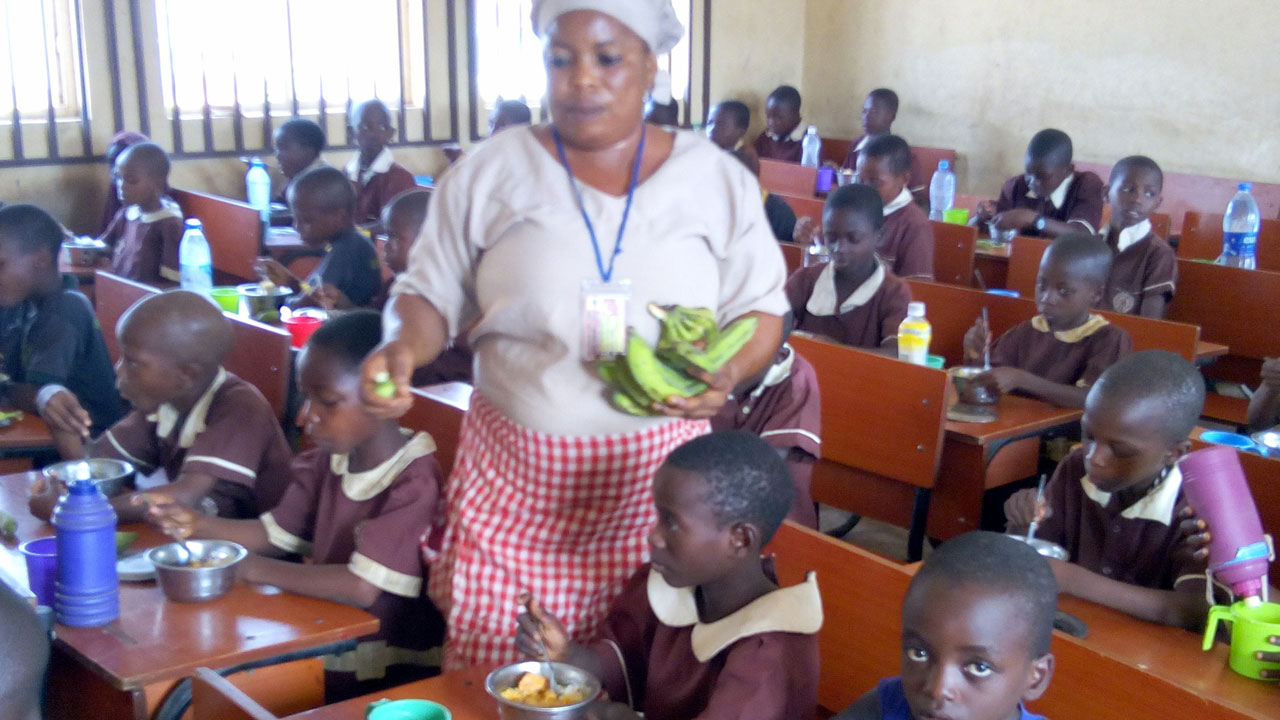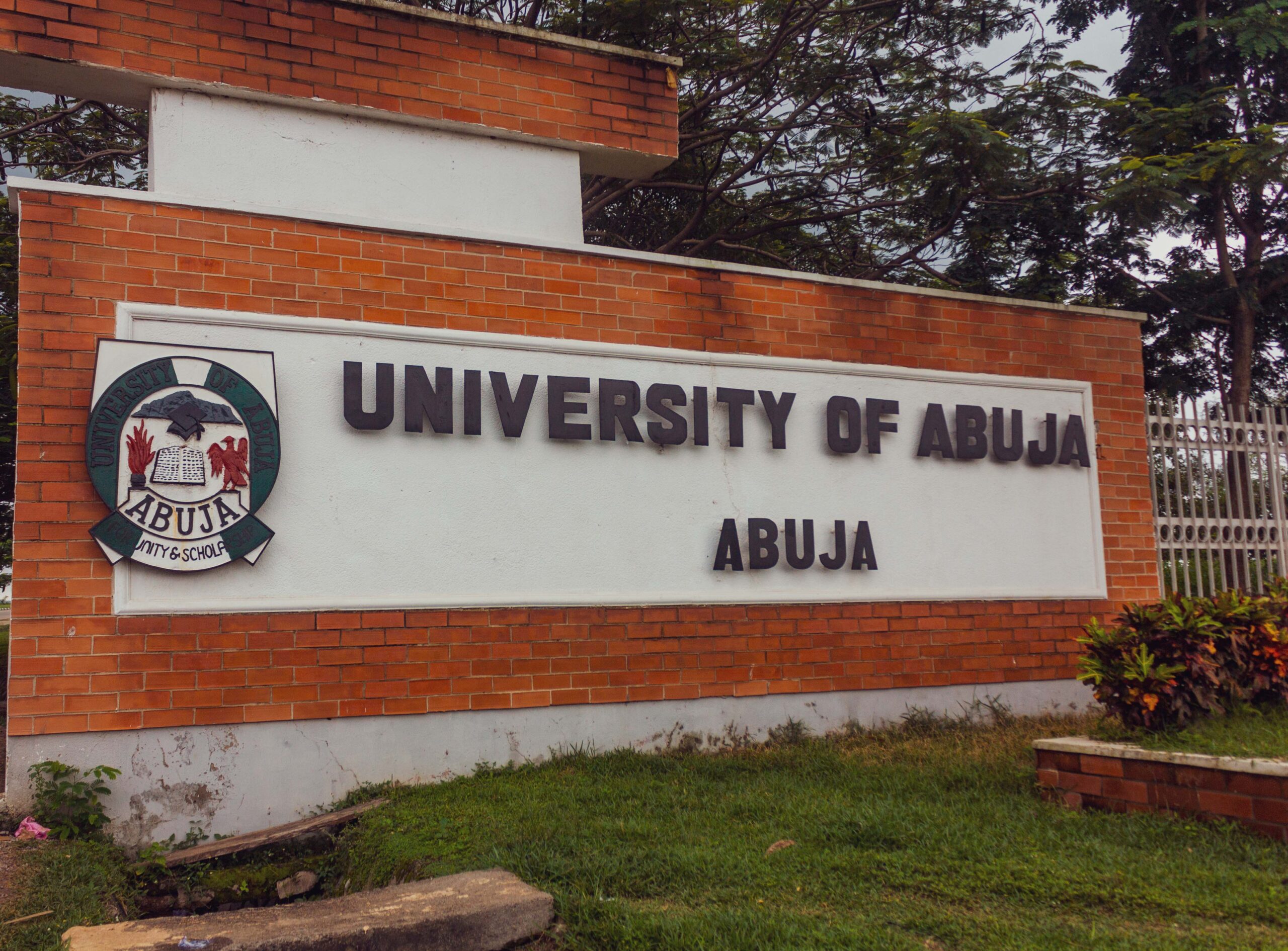
• In Kano, FG reportedly feeds over one million pupils weekly, but millions not captured
• Over 100,000 pupils await continuation of programme in Ondo
• In Rivers, scheme increases enrolment, boosts academic performance
• Osun vendors lament hike in food prices • Criticisms trail programme in Anambra
The National Home Grown School Feeding Programme (NHGSFP) –is part of a N500 billion funded social investment programme designed by the Federal Government to tackle poverty, improve the health and education of children and other vulnerable groups. The programme aims to feed over 24 million school children, which will make it the largest school feeding programme of its kind in Africa.
Nigeria has one of the highest burdens of childhood malnutrition. In fact, malnutrition disorders affect more than 42 per cent of schoolchildren in the country and are responsible for 49 per cent absenteeism of primary school age children. The United Nations’ agency, UNICEF, estimates that 2.5 million Nigerian children under the age of five suffer from severe malnutrition each year, with about half a million children dying from it. As part of his campaign promises in 2015, President Muhammadu Buhari thus launched the NHGSFP in June 2016. The target is to give pupils one free meal a day.
It is likely the administration must have taken a cue from Thailand. Between 1982 and 1986, the Asian nation put in place a nutrition policy that linked malnutrition to poverty alleviation and rural development and incorporated the primary healthcare approach, with greater emphasis on community participation.
Included in this policy was the provision of subsidies for school lunch in rural primary schools. As a result, it reportedly reduced its poverty rates from 27 per cent to 9. 8 per cent and the proportion of underweight children in Thailand also fell by nearly half in the same period.
Across the states, there are reports on the gains and pains of the scheme, how NHGSFP has increased school enrolment and reduced absenteeism and the challenges.
IN South East, one thing that schools benefiting from the scheme would determine is whether the programme, which commenced in 2016, had really improved enrolment in public primary schools in the zone.
Although there are claims that the programme has not only improved enrolment and active participation of pupils in public schools, these claims leave much to be desired when weighed against the fact that private primary schools still dominate the zone in high population, despite their higher fees.
Even with free feeding and other benefits attached to it, parents still prefer to take their wards to private schools, while some pupils in selected public schools still take their lunch to school, thereby casting doubt on whether the scheme has actually improved enrolment in public primary schools.
In Enugu state for instance, officials of the programme claimed that it is feeding pupils in 799 out of the 1200 public primary schools in the state, since it commenced in February 2017. The present figure leaves a gap of about 400 schools not covered.
The population of schools where the programme is running is put at 313,000 with about 1,229 cooks engaged in the various local governments to prepare and serve the meals.
State coordinator, Mr Ifeanyi Onah, told The Guardian that the programme had moved smoothly in the state, having improved enrolment and pupils’ learning ability, while teaching had been made easier as pupils now pay more attention to what was being taught.
Although he could not give a detailed account of the enrolment figure before the programme commenced, Onah said such was the essence of the enumeration, which was ongoing in the state, stressing that it would afford government opportunity to reassess the project.
He stated that apart from improving enrolment, the programme has created jobs and brought peace in some homes where hitherto, some women were jobless.
“On the part of farmers, who before now did not have much hope on where to sell their farm produce; they are now sure of where to supply them. Moreover, our local women can now do banking transactions because all the payments they receive from the supply of food to schools are done through banks, Onah stated.
He said the Federal Government stopped the programme in the wake of the COVID-19 lockdown but resumed in May this year.
Investigation by The Guardian however revealed that though the programme has resumed in the state, some of the vendors are yet to return or may not be willing to continue with it. This followed what one of them described as “high cost of food items in the market,” which may be difficult for some persons to meet based on the amount they are being paid.
“A good meal now is not less than N1000 because of the cost of items. In this programme, what they started paying us since 2017 is what they are still paying and they want us to maintain the same meal standard. I do not think it is possible because we buy from the same market. So, I want to tell you that some of us are asking for reviews to enable us to do the work. I have not stopped. I still cook for my school. The challenge there is the cost of items,” Mrs. Charity Ugwu, one of the cooks said.
Although she was not prepared to disclose how much she receives, Ugwu said the payments became irregular during the COVID-19 pandemic, adding, “when I heard that there is a committee sent to the state for enumeration, I was happy because we will tell them why they need to review our pay. Some of the foods we prepare include beans, moi moi, Okpa and rice with egg. Yam is prepared daily in accordance with the menu.
Confronted with some of the challenges, Onah said: “What is happening is not a secret. If the Federal Government pays, they will be paid. When there was a national lockdown, the programme stopped. It was not peculiar to Enugu. The Federal Government has called workers back to work since May this year to continue the school feeding programme.
IN Kano, about 1,225,804 pupils of public primary schools are currently captured in the scheme. Although the feeding programme is being rationed across the 44 local government areas of the state, the scheme is yet to cover millions of pupils in several public schools.
Head count records provided by the state ministry of education showed a total of 2,540,782 pupils in the range of those eligible for the feeding programme.
Out of this figure, however, only 1,225,804 pupils are currently benefiting from the scheme, leaving out about 1,314,978 pupils. Similarly, the scheme is only operational in 5,200 public primary schools out of 6,638 across 44 councils, while about 1,438 schools are missing out of the scheme.
State coordinator, Baba Zubairu, who explained the reason for the variation noticed in the number of beneficiaries, said the differences were not deliberately intended to deny certain pupils.
Although the scheme initially kicked off in Kano in 2017, it was suspended in 2019 because of the transition of the scheme from the office of the Vice President to the Ministry of Humanitarian Affairs.
Apart from the little gap, Zubairu said the programme enjoyed wide acceptance in Kano. For instance, he said the scheme had increased pupils’ enrolment as many parents who could not afford to send their wards to school because of feeding have been settled by the scheme.
Besides, he said the scheme has provided job opportunities to over 12,000 cooks and hundreds of people who were in turn engaged by the cooks. Local farmers, Zubairu said, are also smiling to the bank as a result of huge market opportunities.
THE school feeding programme was suspended in Kaduna State in the wake of COVID-19 lockdown and it is expected to resume by July.
The programme manager, Mr Umar Yaro, said the state was paid upper week to resume the scheme, but will only cover 23 councils. Yaro said the cooks were directly paid by the government and will resume cooking once they returned from the holidays.
“The cooks have confirmed receiving alerts and we have directed banks not to allow them to touch the money until when schools resume.
Yaro said the scheme has been improved upon as cooks and vendors now have a cash verification system, which includes ATM cards bearing their photographs and unique identification.
Besides, he disclosed that there is standardised measuring equipment to make the food more nutritious. A father who has two pupils at LEA Kawo Primary School, Saidu Usman, said the resumption of the scheme will relieve him of the stress of feeding his children and appealed to the government not to suspend it again.
SINCE the HGSFP was launched in Ondo State, it has experienced a lot of challenges across the 18 local councils.
Investigation revealed that since the school resumed for third term, the vendors have not been seen to provide food for the pupils. It was also gathered that they stopped before the close of the second term.
One of the teachers confirmed that the vendors stopped coming, following the government’s failure to pay them. The Federal Ministry of Humanitarian Affairs, Disaster Management and Social Development engaged stakeholders from National Orientation Agency, (NOA), National Youth Service Corps (NYSC), National Bureau of Statistics (NBS), National Population Commission (NPC) and Ondo State government for the project.
The Guardian learnt that the engagement was to ensure successful enumeration exercise for pupils across primary schools, who have been benefitting from the scheme.
The team leader, Mrs. Kemisola Olasetemi, said the meeting was to fine-tune the process of acquiring data of pupils benefiting from the scheme. He said with such data, the Federal Government would be able to increase the number of beneficiaries, as non-availability of database has resulted in poor planning.
Olasetemi lamented that there are relevant international bodies, which are willing to give interventions where necessary, but for lack of data, have not been able to key into the programme.
She said once the data is captured, non-governmental organisations would readily come in to support the government. Olasetemi said with the growing number of pupils, getting valid data is imperative.
Senior Special Adviser to the governor on multilateral and intergovernmental relations, who is the state focal person, Mrs. Bunmi Ademosu, said data accuracy is vital to the success of the scheme. He said the figures are expected to be reviewed every four months but has not been done in the last four years.
Ademosu charged community leaders, especially parents, to ensure that their out-of-school children took advantage of the opportunity and return to school
SOME teachers in Rivers State have attributed the increase in enrolment in state public schools to the free feeding programme.
A visit to some public primary schools in Obio/Akpor, Emohua and Port Harcourt City local government, showed that the programme is still on and has been impactful on both pupils and parents.
However, inadequate funding and late payment of food vendors pose a great challenge to sustainability of the programme.
Head Teacher of Modern Primary School, Mgbuosimini in Obio/Akpor council, Mrs. Umoroduah Lima, said the programme is boosting enrolment and encouraging pupils to pay more attention to learning in school.
Lima, who commended the government for its commitment, also advocated improved funding for food vendors to give pupils nourishing diet. “Initially, vendors were feeding the children well, but at a point, the food was reduced. Then, we started complaining of quantity because it’s no longer enough as the children’s population has increased. The vendors complained that the money given to them was small.”
Similarly, at state school Omofo, Rundele, in Emohua local government area, a teacher, who pleaded anonymity, commended the government for the programme and called for its sustenance.
IN Osun State, almost all the 1,686 public primary schools in the state benefited from the programme, which was later stalled due to COVID-19 lockdown.
Visits to some primary schools in Osogbo, showed that food vendors have not resumed work since the third term started.
At St Andrew’s Primary School, Oke-Baale, a signpost of the programme was erected at the entrance, but checks revealed that students were not fed.
One of the pupils in class two, who identified himself as Toheeb, said they have not been fed since they resumed third term.
At All Saint’s Primary School, Owo-Ope, Osogbo, a parent told The Guardian that the programme had been stopped “for a very long time.”
In an interview, a food vendor employed by the state government, Mrs. Mistura Ojerinde, confirmed that the scheme was yet to resume for the third term. Ojerinde said: “When we were engaged at the beginning of this programme, a bag of beans was N16, 000 but it now costs N55, 000. A bag of rice was N18, 000, but it is now sold at N30, 000. And the government has been giving us N42. 40 kobo to feed a pupil per day. So, we don’t know how to manage that. That’s a challenge we want the government to address.”
Corroborating Ojerinde’s submission, another food vendor, Mrs. Morufat Ganiyu, serving at Ansaru Deen Primary School, Isale Osun, said all vendors did not work during the lockdown since pupils were at home.
On the quality of food being served, she said: “On Monday, we give pupils rice, egg and egusi soup. On Tuesday, rice and beans; Wednesday, corn meal (Egbo) and beans; Thursday, yam and beans, beans and corn meal (Egbo) for Friday. We give them these food items with egg, fresh fish, chicken and turkey.”
The focal point person in the state, Mr Abimbola Bello, argued that the school feeding programme has been reactivated in the state after COVID-19 lockdown stalled it.
THE NHGSFP was suspended in Anambra State during the COVID-19 pandemic lockdown last year, but reintroduced this year for all pupils in public primary schools from primary one to three. Anambra was the second state in Nigeria to benefit from the programme when it kicked off in 2016.
The programme manager, Mrs. Uzoamaka Eriken, said a survey carried out showed a reasonable improvement in pupils’ enrolment across the state.
“Pupils are served adequate meal per day, for five days in a week, with cooks recruited from the local community where the school is located for proximity. Meals served include local jollof rice, beans with plantain/potatoes, yam porridge, moi moi and Okpa with vegetables.
According to Eriken, as at December 8, 2020, 1,050 primary schools were engaged with a feeding population of 104,504 in primaries one to three, with 1,009 cooks, while in 2021, the number of schools increased to 1,069 with over 200,000 pupils fed and 1,020 cooks.
On the challenges, she said some parents instructed school heads that their children should not be served any meal from the feeding programme, irrespective of how hygienically prepared.
“We carried out a nutrition survey and saw some improvement on the pupils: the height, results and performance. We urge the Federal Government to intervene and extend the scheme to primary four and five classes.” She said the state is working hard to scale up the programme, reduce poverty and increase enrolment, while parents have shown appreciation and satisfaction for the programme.
However, a private school proprietor, Mr Jideofor Henry criticised the programme, arguing that as a national intervention scheme, the Federal Government should not have restricted it to public primary schools.
“It should be extended to every child in Nigeria. It is run from tax-payers money, oil wealth and revenues from various sources. It is a no-point achievement by the present administration,” Henry stated.
A parent, Mrs. Rachael Nwanenna, said the scheme should be discontinued and the money invested in massive industralisation to create jobs for unemployed youths.
IN Jos, Plateau State, the template of the programme showed that 18,000 pupils from primary and junior secondary schools were to be fed in Jos North local government.
Reports indicated that contractors were appointed to supply meals based on the Federal Government’s template and supervised by the state coordinator, Dr. Summaya Hamza.
However, headmaster of one of the public schools in Plateau, Mr. Vincent Pam, said when the programme started, less than five schools benefited from the scheme.
“We only heard on Nigerian Television Authority (NTA) that primary schools were being fed, but I suspect the government is allegedly using the programme to siphon money. Even during COVID-19 lockdown when pupils were at home, the government claimed pupils were fed. How is that possible? For anybody to tell me that the objective of the feeding programme has been achieved is a lie,” Pam stated.
Another stakeholder, Mr. Peter Jambo, said: “I have not seen the benefits of the feeding programme since it started. Education in the North has been under threat for over two years, reports of kidnapping of school children have become the order of the day. Many parents are scared of sending their wards to public schools. Government’s claim of feeding 18,000 pupils in Jos North is fake, fictitious and patronising. Fifty-eight schools, comprising 18,000 pupils, are to benefit from the scheme. That was the expectation, but none is benefiting.
Coordinator of the State Universal Basic Education Board (SUBEB), Mrs. Nda Isa, who spoke on whether contractors were being paid their emoluments as and when due, told The Guardian that the payment is not consistent.
IN Abia State, the programme was flagged-off by Governor Okezie Ikpeazu, on June 10, 2016, at Amapu Ntigha Primary School, in Isiala Ngwa local government council, until its suspension in the wake of COVID-19 pandemic, but has now resumed since schools were reopened.
The NHGSFP, which is for pupils in primaries one to three is run jointly with that of the state government designed for public school pupils in primaries four to six and nursery classes. The programme is coordinated by Gabriel Ahuruonye and overseen by the Focal Person, Chinenye Nwaogu.
About 655,000 pupils in 1,030 schools are benefiting from the scheme, with 3,058 persons engaged in cooking and serving pupils. The meal comprises beans, rice, egg, yam and plantain, all procured locally.
The cost of a meal per pupil is N70, while the wife of the governor provides packs for packaging the meals, including water containers.
Apart from saving parents the cost of providing lunch, the programme was designed to create opportunities for standard and balanced meals, healthier pupils, boosted enrolment, employment and income for cooks and farmers.
Nwaogu lamented that since the inception of the scheme, there has been no funding from the Federal Government for logistics and monitoring, especially rural schools.
He said while about N450m is remitted to the state monthly for the scheme, an additional N10m is required for operations and logistics monthly.
Nwaogu called for a coordinated food supply with each state’s peculiarities carefully evaluated. Ahuruonye noted that in view of the rising cost of food items, the extant cost of N70.00 meal per pupil should be reviewed. This was corroborated by two cooks, Mrs. Happiness Onuoha and Mrs. Lilian Nwoko, who called for a review of the money being paid to them from N86, 000 and N74, 000 to N150, 000 and N120, 000 respectively.
In her assessment of the scheme, a Headmistress, Mrs. Anne Okereke, said it has increased enrolment in public primary schools and recommended that the lapses should be addressed for greater efficiency.
IN Cross River State, the programme took off in November 2017. The state Commissioner for Humanities and Social Welfare, Blessing Egbara, said the governor established the ministry to implement the President’s intervention schemes.
A staff of Government Primary School, Mrs. Linda Essien, lauded the Federal Government for the scheme and advocated the provision of permanent school canteens where meals can be prepared to ease stress.
One of the cooks, Mrs. Joy Umoh Eyong of Presbyterian Primary School, Ugep, commended the government’s effort at eradicating hunger and unemployment in the country, urging it not to relent.
However, an educationist, Mike Collins, did not think providing one meal per day for pupils is the most important thing.
Collins said: “To me, it is not a priority. There are better things to do for our schools than the feeding programme. A child comes to school and after feeding; he has no chair to sit on or materials to write on. What is the use of the feeding when schools lack basic facilities?
“I do not think that there are many children who will not eat before going to school. So, what is the use of the programme to a child without a uniform, no seat, books or good classrooms? When the school is attractive and has facilities for learning, children will be encouraged to enrol. It is not only by feeding them. The feeding programme is a misplaced priority.”






